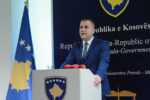Serbia’s Interior Minister, Ivica Dačić, once again blurred the line between patriotism and historical revisionism this time by honoring a convicted war criminal. At a ceremony today, Dačić unveiled a bust of the late police lieutenant general Obrad Stevanović, describing him as an “honorable and great patriot,” while standing side by side with Nikola Šainović, the convicted war criminal and former Serbian prime minister found guilty by The Hague Tribunal for atrocities in Kosovo.
The event, presented as a tribute to “heroes,” quickly turned into another exercise in whitewashing Serbia’s war record. In his speech, Dačić declared that the wars across the former Yugoslavia were “imposed,” and warned against accepting the “foreign interpretations” of history a familiar narrative used by Belgrade officials to deny responsibility for state-led crimes committed during the 1990s.
“What happened and the sacrifices made for the freedom of the country must remain in our collective memory,” Dačić said, portraying figures like Stevanović and Šainović as symbols of honor rather than agents of repression and brutality.
The ceremony, which coincided with the celebration of the baptism of the Association of Veterans of Special Police Units, was yet another reminder of how Serbian institutions continue to glorify individuals directly tied to war crimes and ethnic cleansing, particularly those committed in Kosovo.
Dačić further announced that the Ministry of Internal Affairs (MUP) will keep supporting associations that “nurture patriotism” and “preserve the culture of remembrance.” In practice, such rhetoric often translates into state-sponsored glorification of war criminals, masked under the language of national pride.
The presence of a convicted war criminal like Šainović sentenced for orchestrating crimes against Kosovo Albanians at an official state ceremony is not just a moral scandal but a political statement. It exposes a Serbia still unwilling to confront its violent past, and a government that continues to romanticize war criminals instead of acknowledging victims.
By celebrating perpetrators instead of justice, Dačić and his ministry send a chilling message: that denial remains the cornerstone of Serbia’s “patriotism.”







